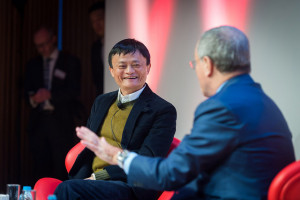By Alexis Fitts May 8, 2015

Drugs ©Justin R
Fast-Track Drugs for the Dying
Johnson & Johnson announced this week that it would create an independent panel to review requests from seriously ill patients to try unapproved drugs, in the face of increasing pressure generated by a number of prominent cases. Organized by NYU’s School of Medicine, the panel includes doctors, bioethicists and patient representatives who will consider the individual requests and recommend an eventual course of action for the company. The panel will, essentially, standardize the practice of offering potentially life-saving drugs to patients who aren’t part of a clinical trial, decisions which had previously been made by individual physicians employed by the company.
Early access to drugs can mean the difference between life and death for patients given the length of time it often takes to get a new drug approved. But for companies fearing lawsuits and backlash over adverse side effects, the process of providing such early access can be a minefield. Though federal law prohibits releasing unapproved drugs to patients, the Food and Drug Administration allows such drugs to be offered for “compassionate use” to patients with life threatening illnesses.
As The Wall Street Journal reports, the number of such cases has increased. In the last fiscal year, about 1,809 requests were made to the FDA, which has approved over 99 percent of the cases. But ultimately, the decision rests with drug companies, which have been accused of resisting requests. As part of the ethics panel, J&J is setting up a single website and toll-free hotline to streamline the process.
Alibaba Names New CEO
Along with better-than-expected revenue, Chinese online retail megolith Alibaba Group announced a change in CEO this week, ushering in a younger generation of leadership. Current COO Daniel Shang will take over as CEO from Jonathan Lu, who has held the position since 2013. With a low-key leadership style, Lu had been referred to as the “alter-ego” of Alibaba founder Jack Ma. The shift will take effect on Sunday.

Jack Ma, Founder and Executive Chairman of China’s Alibaba Group, with British businessman Sir Martin Sorrell, chief executive of WPP, at GREAT Festival of Creativity. ©UKTI
The company reported a 45% increase in revenue during its first quarter, in part on continued growth in mobile transactions. Alibaba’s stock price surged after the announcement of the leadership change, despite Lu’s prominence within the company. Lu helmed Alibaba during its record-breaking IPO in September, when it was priced at $68 per share, raising a total of $21.8 billion. After rising to $115 in November, shares in the company have since fallen to $80. According to Business Insider, rumors are circulating that Jonathan Lu was ousted because he lost the confidence of the company’s founder. “I am grateful to Jonathan Lu for his excellent leadership and management over the past several years, and I look forward to his continued contribution as a key leader in helping Alibaba Group train and develop the next generation of leaders,” Ma said in a statement.
A Newer, Cheaper Whole Foods—For the Millennials

Greens and vegetables at a Whole Foods market ©Yvon
Whole Foods is starting a lower priced grocery brand, targeted to younger shoppers who covet the upscale grocery chain’s healthy-living oriented products but can’t quite afford the aspirational prices. The series of sister-stores will offer similarly curated items, but at a lower price point. “It will deliver a convenient, transparent, and values-oriented experience geared toward millennial shoppers, while appealing to anyone looking for high-quality fresh food at great price,” Whole Foods founder Walter Robb said in a statement. He also speculated that the new chain might be as abundant as Whole Foods, which has over 400-stores across the country.
The announcement comes in the wake of news that Whole Foods’ growth might be lagging. In the 12-weeks through April 12, the chain reported store-by-store sales up 3.6%—trailing expectations of 5.3% for the quarter and well shy of the double-digit growth that’s set the store’s standard in recent years. Whole Foods had already made moves to attract a broader array of shoppers, cutting prices on fresh produce and launching its first national advertising campaign. Yet the popular supermarket chain has also been losing market share as its rivals enter the organic and health food domain. It faces competition from new specialty retailers, like Sprouts Farmers Market and Fresh Market, and old competitors such as Kroger, Wal-Mart, and Target, which have been boosting their organic food selections.
Tesla’s New Batteries “Off the Hook”
Solar panels
© Mountain/ Ash
Just a week after Tesla announced a new line of batteries, The Guardian reports that Tesla CEO Elon Musk is finding the demand overwhelming. “We have to triage our responses to those who want to be a distributor,” Musk said during a company call. “It’s like, crazy off the hook. It seems to have gone super viral.” The new releases include Powerwall, a home battery that can store energy generated by solar panels and Powerpack, a commercial version of the same thing.
In the first week of the release the company received 38,000 orders for Powerwall and 2,800 business orders for Powerpack. This means that in order to get your hands on either device, you’ll have to wait until mid-2016. Musk said that battery sales could overtake the company’s signature electric vehicle as its biggest earner—which would be helpful now that Tesla faces competition from established car makers, and possible Apple, in the personal electric vehicle sector. The price of a Tesla sedan starts at $76,200, yet the company plans to reveal a new model next March that would cut the price in half. In contrast, the two versions of Powerwall cost $3,000 and $3,500, depending on size.
The Cost of a $10 Manicure? Labor Violations.

Pedicure ©Sarah Ackerman
Writing in The New York Times, reporter Sarah Maslin Nir released a 9-month investigation Thursday into working conditions in New York City’s nail salons. New York City has one of the densest supplies of nail salons of any city in the U.S., a situation that drives prices down and ultimately depresses wages and creates abusive working conditions. One Upper West Side Store starts employees at $10 per day, many employees reported working through months long apprentice periods unpaid.
Interviewing workers employed at 150 nail salons, in four languages, the Times found that the bulk of employees earn below minimum wage—if they’re paid at all. Workers endure all manner of humiliation, including having their tips docked as punishment for minor transgressions, constant video monitoring by owners, even physical abuse,” wrote Maslin Nir. “Employers are rarely punished for labor and other violations.”
This entry was posted on Friday, May 8th, 2015 at 10:14 pm. It is filed under Week in Review. You can follow any responses to this entry through the RSS 2.0 feed.
Comments are closed.
